现在完成时语法专项练习与总结
初中英语现在完成时语法归纳总结及练习
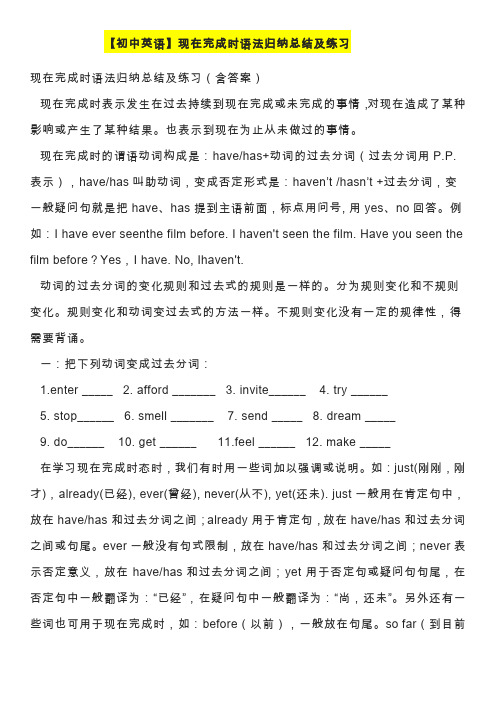
【初中英语】现在完成时语法归纳总结及练习现在完成时语法归纳总结及练习(含答案)现在完成时表示发生在过去持续到现在完成或未完成的事情,对现在造成了某种影响或产生了某种结果。
也表示到现在为止从未做过的事情。
现在完成时的谓语动词构成是:have/has+动词的过去分词(过去分词用P.P.表示),have/has叫助动词,变成否定形式是:haven’t /hasn’t +过去分词,变一般疑问句就是把have、has 提到主语前面,标点用问号, 用yes、no回答。
例如:I have ever seenthe film before. I haven't seen the film. Have you seen the film before?Yes,I have. No, Ihaven't.动词的过去分词的变化规则和过去式的规则是一样的。
分为规则变化和不规则变化。
规则变化和动词变过去式的方法一样。
不规则变化没有一定的规律性,得需要背诵。
一:把下列动词变成过去分词:1.enter _____2. afford _______3. invite______4. try ______5. stop______6. smell _______7. send _____8. dream _____9. do______ 10. get ______ 11.feel ______ 12. make _____在学习现在完成时态时,我们有时用一些词加以强调或说明。
如:just(刚刚,刚才),already(已经), ever(曾经), never(从不), yet(还未). just一般用在肯定句中,放在have/has 和过去分词之间;already 用于肯定句,放在have/has 和过去分词之间或句尾。
ever一般没有句式限制,放在have/has 和过去分词之间;never表示否定意义,放在have/has 和过去分词之间;yet用于否定句或疑问句句尾,在否定句中一般翻译为:“已经”,在疑问句中一般翻译为:“尚,还未”。
现在完成时练习题及答案

现在完成时练习题及答案一、选择题1、 I ______ my homework yetA haven't finishedB have finishedC finishedD didn't finish答案:A解析:yet 常用于现在完成时的否定句和疑问句中,现在完成时的构成是“have/has +过去分词”,否定形式是“haven't/hasn't +过去分词”,A 选项 haven't finished 符合现在完成时的否定形式。
2、 They ______ in this city since 2008、A liveB livedC have livedD are living答案:C解析:“since +时间点”是现在完成时的标志,现在完成时的构成是“have/has +过去分词”,C 选项 have lived 符合现在完成时的结构。
3、 Have you ever ______ to Beijing?A goneB beenC wentD go答案:B解析:have been to 表示“去过某地(已经回来)”,have gone to 表示“去了某地(还没回来)”,根据句意“你曾经去过北京吗?”,这里表示去过且已经回来,所以用 have been to,B 选项 been 符合。
4、 My father ______ the Party since 1978、A joinedB has joinedC was inD has been in答案:D解析:“since +时间点”是现在完成时的标志,join 是短暂性动词,不能与时间段连用,要转化为 be in,现在完成时的构成是“have/has +过去分词”,D 选项 has been in 符合现在完成时的结构。
5、—How long ______ you ______ here?—For two yearsA have; studiedB did; studyC do; studyD will; study答案:A解析:根据答语“For two years”可知问句要用现在完成时,现在完成时的构成是“have/has +过去分词”,A 选项 have; studied 符合现在完成时的结构。
(英语)初中英语现在完成时专项训练100(附答案)及解析
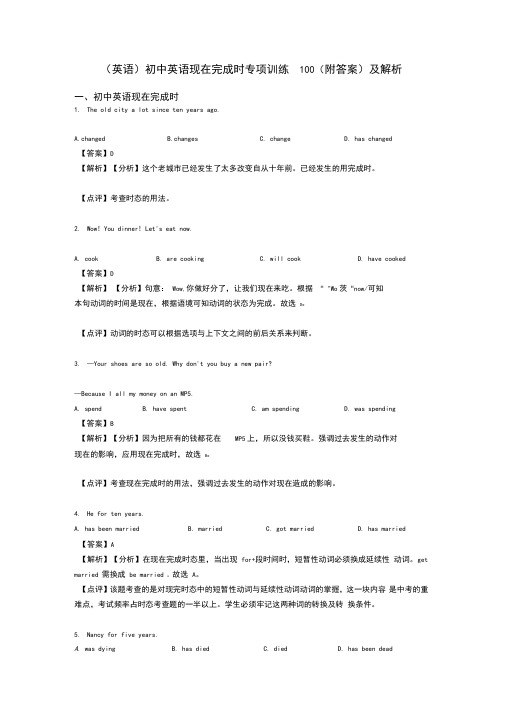
(英语)初中英语现在完成时专项训练100(附答案)及解析一、初中英语现在完成时1.The old city a lot since ten years ago.A.changedB.changesC. changeD. has changed【答案】D【解析】【分析】这个老城市已经发生了太多改变自从十年前。
已经发生的用完成时。
【点评】考查时态的用法。
2.Wow! You dinner! Let's eat now.A. cookB. are cookingC. will cookD. have cooked【答案】D【解析】【分析】句意:Wow,你做好分了,让我们现在来吃。
根据“ "Wo茨“now/可知本句动词的时间是现在,根据语境可知动词的状态为完成。
故选Do【点评】动词的时态可以根据选项与上下文之间的前后关系来判断。
3.—Your shoes are so old. Why don't you buy a new pair?—Because I all my money on an MP5.A. spendB. have spentC. am spendingD. was spending【答案】B【解析】【分析】因为把所有的钱都花在MP5上,所以没钱买鞋。
强调过去发生的动作对现在的影响,应用现在完成时,故选Bo【点评】考查现在完成时的用法,强调过去发生的动作对现在造成的影响。
4.He for ten years.A. has been marriedB. marriedC. got marriedD. has married【答案】A【解析】【分析】在现在完成时态里,当出现for+段时间时,短暂性动词必须换成延续性动词。
get married 需换成be married o故选A。
【点评】该题考查的是对现完时态中的短暂性动词与延续性动词动词的掌握,这一块内容是中考的重难点,考试频率占时态考查题的一半以上。
现在完成时专项训练题及答案
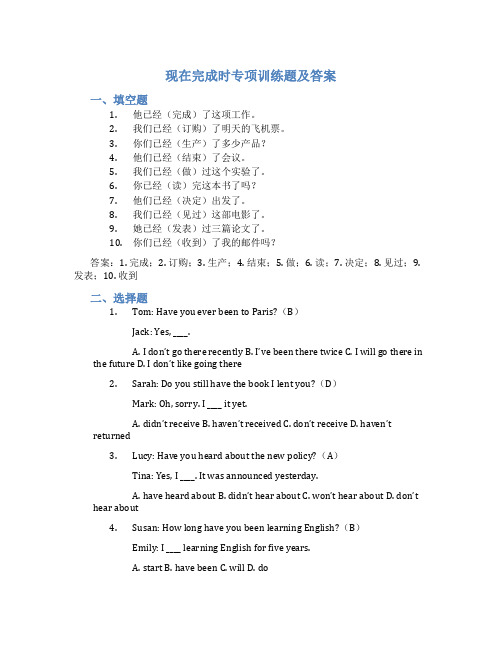
现在完成时专项训练题及答案一、填空题1.他已经(完成)了这项工作。
2.我们已经(订购)了明天的飞机票。
3.你们已经(生产)了多少产品?4.他们已经(结束)了会议。
5.我们已经(做)过这个实验了。
6.你已经(读)完这本书了吗?7.他们已经(决定)出发了。
8.我们已经(见过)这部电影了。
9.她已经(发表)过三篇论文了。
10.你们已经(收到)了我的邮件吗?答案:1. 完成;2. 订购;3. 生产;4. 结束;5. 做;6. 读;7. 决定;8. 见过;9. 发表;10. 收到二、选择题1.Tom: Have you ever been to Paris?(B)Jack: Yes, ____.A. I don’t go there recentlyB. I’ve been there twiceC. I will go there inthe future D. I don’t like going there2.Sarah: Do you still have the book I lent you?(D)Mark: Oh, sorry. I ____ it yet.A. did n’t receiveB. haven’t receivedC. don’t receiveD. haven’treturned3.Lucy: Have you heard about the new policy?(A)Tina: Yes, I ____. It was announced yesterday.A. have heard aboutB. didn’t hear aboutC. won’t hear aboutD. don’thear about4.Susan: How long have you been learning English?(B)Emily: I ____ learning English for five years.A. startB. have beenC. willD. do5.Mike: Do you know where John is?(A)Tom: Yes, ____. He has gone to the supermarket.A. I doB. I do knowC. I am knowingD. I knowing答案:1. B;2. D;3. A;4. B;5. A三、改错题请改正以下句子中的错误:1.I have went to the cinema last night.改为:I went to the cinema last night.2.She has never been see such a beautiful sunset before.改为:She has never seen such a beautiful sunset before.3.We has already finished our homework.改为:We have already finished our homework.4.Have you bought the tickets for the concert already?改为:Have you already bought the tickets for the concert?5.They have been lived in this city since 2010.改为:They have lived in this city since 2010.答案:1. I went to the cinema last night.;2. She has never seen such a beautiful sunset before.;3. We have already finished our homework.;4. Have you already bought the tickets for the concert?;5. They have lived in this city since 2010.四、对话配对题将下列对话的两部分进行配对。
现在完成时语法及练习
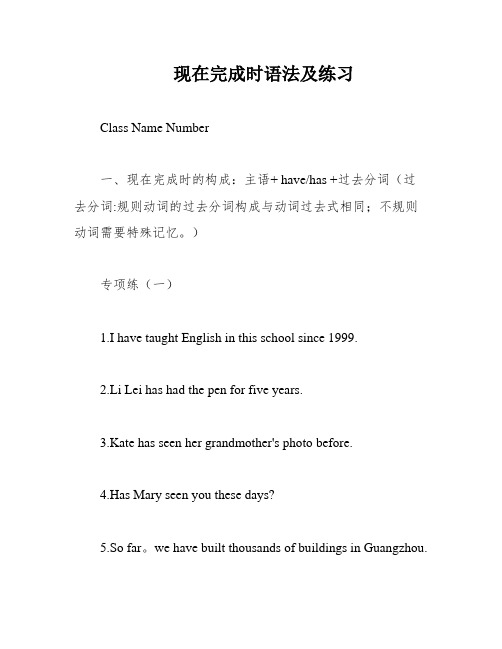
现在完成时语法及练习Class Name Number一、现在完成时的构成:主语+ have/has +过去分词(过去分词:规则动词的过去分词构成与动词过去式相同;不规则动词需要特殊记忆。
)专项练(一)1.I have taught English in this school since 1999.2.Li Lei has had the pen for five years.3.Kate has seen her grandmother's photo before.4.Has Mary seen you these days?5.So far。
we have built thousands of buildings in Guangzhou.二、否定式:主语+ haven’t/hasn’t +过去分词。
疑问式:Have / Has +主语+过去分词。
简略答语:Yes,主语+have/has.(肯定)No,主语+ haven’t/hasn’t.(否定)专项练(二)1.-- Have you finished your work?-- Yes。
I have.2.-- Has she ever learned English?-- Yes。
she has.3.He hasn't finished his homework yet.三、现在完成时的含义之一:表示过去发生或已经完成的动作对现在造成的影响或结果,常与never/ever,just,already/yet,before,so far等连用。
以 already。
just 和 yet 为标志,表示到现在为止动作或状态已经、刚刚或还没有发生。
例如:我已经完成了我的作业。
改写为:My homework is already finished.他刚刚看过这部电影。
改写为:He has just watched the movie.他还没有回来。
现在完成时(含练习题及答案)

现在完成时定义:表示在过去的某个时间已经发生的行为或者曾经做过的事情对现在产生的影响和结果。
构成:have/has+动词的过去分词(done)常与以下时间状语连用,比如:1. already/yet- I have already read that book. 我已经读过那本书了。
- Flora hasn’t finished her homework yet. 弗洛拉还未完成作业。
2. just- I have just received a letter from my brother.我刚刚收到我兄弟的来信。
3. recently- I haven’t seen him recently. 我最近没见过他。
4. ever/never- Have you ever been to London? 你去过伦敦吗?- I have never been to London. 我从未去过伦敦。
5. so far- So far I have learnt to speak German, English and French.到目前为止,我已经学会了说德语,英语和法语。
6. for引导的短语表示延续的时间,延续性动词多用于此。
- We have studied English for six years. 我们已经学习英语六年了。
7. since引导的短语,或者从句- He has lived here since 1997. 自从1997年,他就住在这里。
- We haven’t seen each other since he moved to London.自从他搬去伦敦,我们就再也没见过。
8. have/has been to 与have/has gone to /has been in的区别- He has been to the Great Wall twice. 他去过长城两次。
(表示去了人已回来)- He has gone to Beijing. 他去了北京。
现在完成时精讲以及练习(附答案)

现在完成时精讲和练习(附答案)一、现在完成时的六种常用情景:(一)表示过去发生或已经完成的动作对现在造成的影响或结果,1、The car has arrived。
车子来了。
(对现在结果的影响是:车子已在门口)2、Someone has broken the window.有人把窗户打破了。
(对现在结果的影响是:窗户仍破着)3、It’s so dark。
Someone has turned off the light.这里很黑,有人刚把灯关了。
(对现在结果的影响是:现在很黑)4、Are you free? I have finished my homework. I am free.你有空吗?我已经做完了家庭作业。
我有空。
(我已经完成了家庭作业,对现在影响是:很有空)。
(二)表示过去已经开始,一直延续到现在的动作或状态。
一般会和表示从过去某一时刻延续到现在(包括“现在”在内)的一段时间的状语连用。
如for+时间段、since+过去的时间点、疑问词how long等。
这时表示持续动作或状态的动词必须是延续性动词。
1、My uncle has worked at this factory for five years。
我叔叔在这个工厂工作已经五年了。
2、Mr. Black has lived in China since 2002。
自从2002年Mr. Black 一直住在中国。
3、How long have you been here?你来这里多久了?4、I have learnt English for more than ten years。
我已经学了10多年的英语。
(从10年前开始,持续到现在)5、She has swum since half an hour ago。
我已经游泳了半个小时。
(半个小时前开始,到现在还在游) (三)经验性用法:表示从过去开始到目前为止这段时间中反复发生的动作或多次出现的状态。
初中英语语法——现在完成时知识点总结归纳
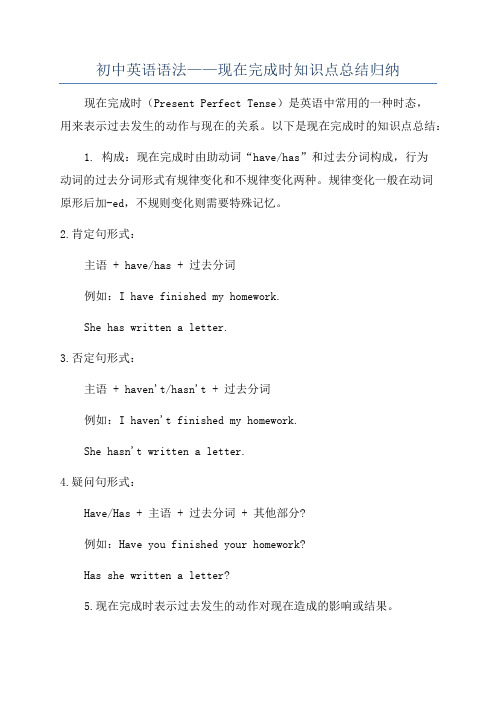
初中英语语法——现在完成时知识点总结归纳现在完成时(Present Perfect Tense)是英语中常用的一种时态,用来表示过去发生的动作与现在的关系。
以下是现在完成时的知识点总结:1. 构成:现在完成时由助动词“have/has”和过去分词构成,行为动词的过去分词形式有规律变化和不规律变化两种。
规律变化一般在动词原形后加-ed,不规则变化则需要特殊记忆。
2.肯定句形式:主语 + have/has + 过去分词例如:I have finished my homework.She has written a letter.3.否定句形式:主语 + haven't/hasn't + 过去分词例如:I haven't finished my homework.She hasn't written a letter.4.疑问句形式:Have/Has + 主语 + 过去分词 + 其他部分?例如:Have you finished your homework?Has she written a letter?5.现在完成时表示过去发生的动作对现在造成的影响或结果。
例如:I have lost my key.(我丢失了我的钥匙,现在找不到了。
)He has broken his leg.(他折断了腿,现在不能走路。
)6.现在完成时还可以用来表示一直延续到现在的动作或状态。
例如:I have lived in this city for five years.(我已经在这个城市住了五年了。
)She has known him since high school.(她从高中就认识他了。
)7.现在完成时与时间状语的连用:现在完成时通常与以下时间状语连用:just(刚刚)、already(已经)、yet(还)、ever(曾经)、never(从未)、recently(最近)、since(自从)、for(持续时间)例如:I have just finished my homework.(我刚完成了作业。
- 1、下载文档前请自行甄别文档内容的完整性,平台不提供额外的编辑、内容补充、找答案等附加服务。
- 2、"仅部分预览"的文档,不可在线预览部分如存在完整性等问题,可反馈申请退款(可完整预览的文档不适用该条件!)。
- 3、如文档侵犯您的权益,请联系客服反馈,我们会尽快为您处理(人工客服工作时间:9:00-18:30)。
现在完成时语法专项练习与总结现在完成时态1.定义:①过去发生的动作对现在造成的影响或结果强调现在的结果。
例:I have already finished myhomework ②过去已经开始一直持续到现在的动作或状态:强调持续到现在。
例:I have lived here since 1990.2.现在完成时的构成have\has+过去分词3.现在完成时的四个基本句型肯定句He has finished the work.一般疑问句 Has he finished the work?否定句He has not finished the work.两回答Yes ,he has. No, he hasn’t.特殊疑问句What has he done?4.在下列情形下用现在完成时(1)九词语①already 已经(肯定句中或句尾)例: I have already found my pen. = I have found my pen already.②yet已经,还(在否定句和疑问句句中代替already )例:I have not finished the work yet.Have you bought a computer yet?③ever曾经(句中) 例:Have you ever seen pandas?④never从不(句中) 例:I have never been to Beijing.⑤just刚刚(句中) 例:I have just done my work.⑥before以前 (句尾) 例:I have never been there before.⑦so far到目前为止例:So far he has learnt 200 words.⑧how long多久例:How long have you lived here?⑨how many times多少次例:How many times has he been to Beijing?(2)两结构(for和since引导的时间)for two months for +一段时间Jim has lived here for 2 months.since last year since +过去点时间Lucy has been in Beijing since 3 years ago.since 3 years ago since 1990since he came here since +过去时态句子He has been in China since he came here.(2)以下时间也是现在完成时的时间:these days,in the last/past three years,(3)两词组have<has>gone to去了某地例:He has gone to Beijing (去了北京) have<has>been to去过某地例:He has been to Beijing. (去过北京)(4)如果句子里面没有时间状语,汉语意思能够加“已经”,往往用现在完成时态。
例:Have you lost your library book? 你已经弄丢了从图书馆借的那本书吗?(5)现在完成时态还常常用于下列句型 They have planted many trees in the last few years. 在过去的几年,他们已经种了很多树。
This is the best book I have ever read. 这是我曾经读过的最好的一本书。
It is the first time I have played the computer games. 这是我第一次玩电脑游戏。
5. 在现在完成时中,一次性动词(也称瞬间性动词)不能和一段时间状语连用例:He has bought the book for 3 years.(错)因buy这个一次性动词不能和一段时间for3 years连用, 改正的办法有五种:①He has bought the book.. (去掉一段时间for 3 years)②He bought the book 3 years ago (改为一般过去时,使句子的意思不变)③It’s 3 years since he bough t the book. = 3 years has passed since he bought the book.(改为固定句型It is---since---)④He has not bought the book for 3 years.(改为否定句)⑤He has had the book for 3 years. (用延续性动词have代替buy)6. 还有其他一次性动词也是这种情况,可参照前面的五种办法改正,前四种改法都一样,第五种改法各不相同,举例如下:①come/arrive/get to/reach → be here\例:I have come here for 3 years.(错)改为:I have been here for 3 years.②leave/go →be away例:He has left for 3 hours.(错)改为:He has been away for 3 hours.③begin/start →be on例:The film has begun for 3 minutes.(错)改为The film has been on for 3 minutes.④open →be open / close → be closed例:The shop has opened for 3 years.(错)改为The shop has been open for 3 years.⑤die →be dead例:His father has died for 3 years.(错)改为:His father has been dead for 3 years.⑥finish/end→ be over例:He has finished the work for 3 days.(错)改为The work has been over for 3 days⑦join 例:I have joined the army for 3 years.(错)改为:I have been in the army for 3 years. 或I have been a soldier for 3 years.⑧buy /catch → have例:I have bought the bike for 3 years.(错)改为:I have had the bike for 3 years.例:He has caught a cold for 3 days.(错)改为:He has had a cold for 3 days.⑨borrow → kept例:I have borrowed the book for 3 years.(错)改为I have kept the book for 3 years.还有其它的归纳如下:break → be broken get up → be up marr y → be married bec ome → be lose → be lost7 延续性动词和终止性动词①延续性动词:表示的动作是能延续的动作,这种动作可以延续下去或产生持久的影响。
如:learn\ work\ stand\ lie\ know\ walk\ keep\ have\ wait\ watch\ sing\ read\ sleep\ live②终止性动词:也叫非延续性动词,瞬间动词,一次性动词。
表示的动作不能延续,即动作发生后立即结束,产生某种结果。
在有了某种结果后,动作就不能再继续下去。
如:leave\ start\ set out\ arrive\ reach\ get to\ begin\ stop\ shut\ turn off\ marry\ put\ put on\ get up\ wake\ fall\ join\ meet\ receive\finish\ end\ complete\ become\ come\ go\ die\ open\ close\ break\ give\ jump\ buy\ borrow8. 终止性动词不能和一段时间状语连用。
He has died for three days.(错)终止性动词die不能和一段时间连用)练习一:用for 或since填空1. Jill has been in Ireland ______Monday.2. Jill has been in Ireland ______three days.3. My aunt has lived in Australia _____ 15 days.4. Margaret is in her office. She has been there _____ 7o'clock.5. India has been an independent country _____1974.练习二:has / have been has / have gone.1. Harry:I saw you in Annabel's Restaurant last night. Diana:No, it wasn't me. I ____ never____ there.2. Sam:Sally and Tim are on holiday, aren'tthey? Where _____ they_____?Sue:To Florida, again.Sam:How many times _____they ____there?Sue:This is their third visit.3. Alan:Where's Tony?Mary:He's got a headache so he ________ to bed.4. A:Where are the boy students ?B:They _____ to the school factory.5. A:Is your father in ?B:No, he ____ to Shenzhen.A: _______he ever ______ there before ? B: Yes, he ___ there several times练习三:用already或yet填空1) Have they taken down the old pictures ______?No, not ________.2) Most of us have finished our compositions ________3) He said he hadn’t visited the exhibition ________.练习四:重点用法1. Both his parents look sad . Maybe they ___(know)what's happened to him .2. He has _____ been to Shanghai , has he ?A. already B.never C.ever D. Still3. Have you met Mr Li ___?A. just B. ago C.before D. a moment ago4. The famous writer _____(write) one new book in the past two year .5.—Our country _____ (change)a lot so far .—Yes . I hope it will be even ______(good) .6.Zhao Lan __ __already ___(study)in this school for two years .7. We ____ (know) Xiao Li since she was a little girl .8. Harry Potter is a very nice film .I_______(see) it twice .9.—These farmers have been to the UnitedStates .—Really ? When _____ there ?A. will they go B. did they goC. do they go D. have they gone10.—____ you ___ your homework yet ? —Yes . I____ it a moment ago .ADid;do;finished BHave done;finished CHave;done have finished Dwill;do; finish练习五:关于动词的延续与非延续1. He died 10 years ago. He ____ ____ ____ for 10 years.2. He borrowed the book 2 weeks ago.He ____ ____ the book for 2 weeks.3. He bought the motorbike a month ago.He ____ _____ the motorbike for a month.4. He arrived here three days ago.He _____ _____ here since three days ago.5. He left here 2 years ago.He _____ _____ _____ from here for 2 years.6. The film began 30 minutes ago.The film _____ _____ _____ for 30 minutes.7. They opened the door an hour ago.The door _____ _____ _____ for an hour.8. They closed the door an hour ago.The door _____ _____ _____ for an hour.9. His father ______ the Party since 1978 .A. joined B. has joined C. was in D. has been in 10.—Do you know him well ?—Sure .We ______ friends since ten years ago .A.were B.have been C.have become D.have made 11.-How long have you___here ? —About two months .Abeen Bgone Ccome Darrived12. Hurry up! The play __________ for ten minutes . A.has begun B.had begun C.has been on D.began 13. His uncle died two years ago .(同)His uncle has _______ for two years14. Her mother has been a Party member for three years Her mother _______ the Party three years ________ .15.It ____ ten years since he left the army .Ais B.has Cwill D. was16.Miss Green isn't in the office .she_______ to the library .A.has gone B. went C.will go D. has been 17. My parents _____ Shandong for ten years .A. have been in B. have been toC. have gone to D.have been练习六:summary and test1.I____ already ____ (see) the film. I ___ (see) it last week.2._ _ he ____(finish) his work today ? Not yet .3.___ you ____(be) to Hong Kong ? Yes, I _____ (be) there twice .4.__ you ever ____(eat ) chocolate sundaes ? No, never.5.My father ____ just ____ (come) back from work He is tired now.6.Where’s Li Ming ? He ____ (go) to the teacher’s office.7.Shanghai ___ (be) a small town hundreds of years ago. Now it __ (become) a large city.8.I ____ (work) here since I ____ (move) here in 1999.9.So far I ____(make) quite a few friends here.10.How long ____ the Wangs ____(stay) here ?For two weeks.11.I have been to Macau before.(否定句)I ___ ____ been to Macau before.12.He hasn’t come to school because he’s ill.____ _____ he come to school?13.He has learned English for 5 years.(提问)____ ___ ____ ____ learned English ?14.I bought a new bike just now.(用just改写)I ____ just ____ a new bike.一般过去时1、用法:一般过去时指的是过去某一时间发生的动作或存在的状态。
